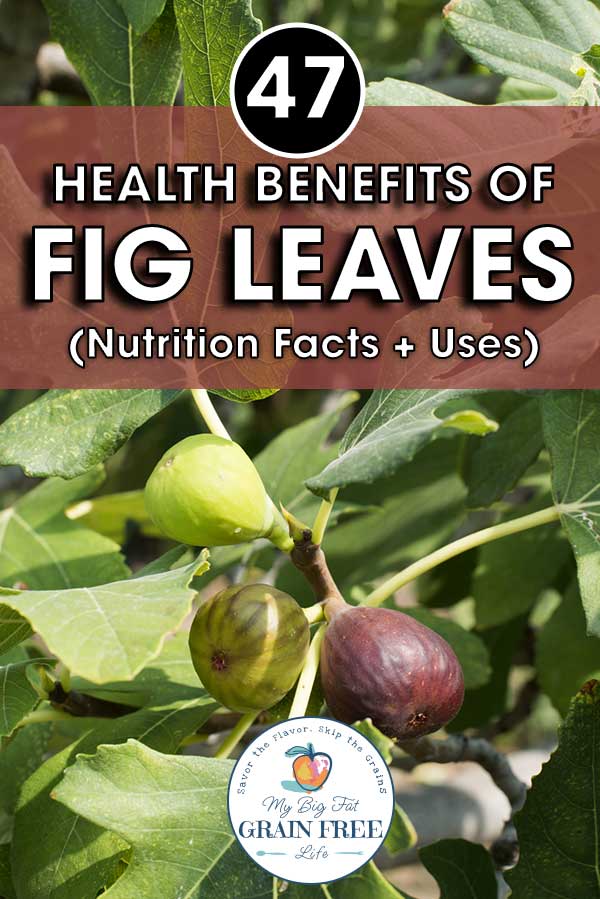23 Best Teas For Sinus Congestion & Infections
This post may contain affiliate links. If you make purchase after clicking a link, I may receive a commission at no extra cost to you.
Last Updated on November 6, 2023
Are you having sinus trouble? Have you thought to drink some hot herbal tea? Learn about 23 of the best teas for sinus congestion and infections.
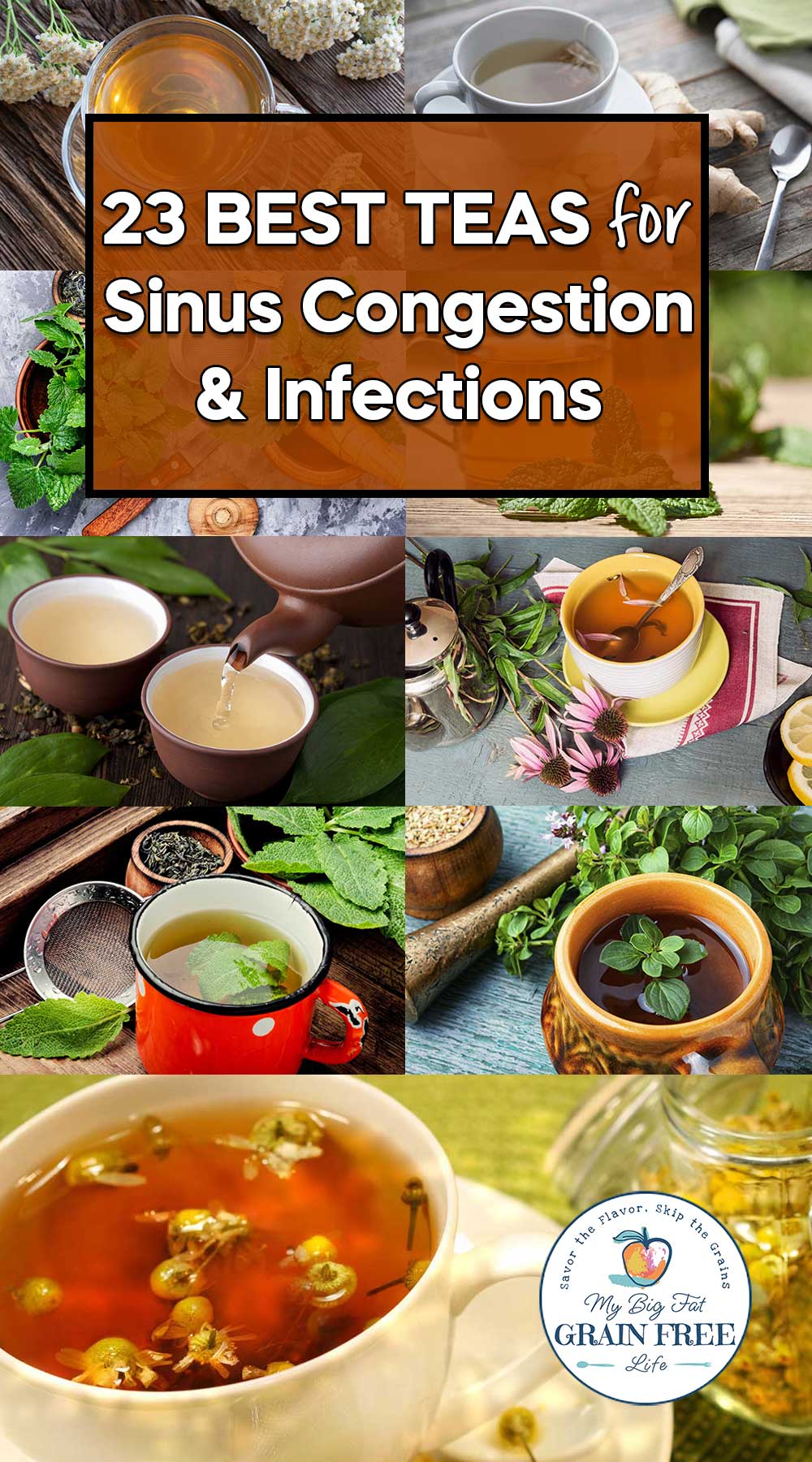
Best Tea For Sinuses
When I don’t feel well, whether it’s due to sinus trouble or a virus, the first thing I do is break out my herbal teas. Drinking hot liquid is always super soothing to me, especially when I am feeling under-the-weather.
I enjoy all types of tea, and I prefer to drink it hot. But, there are certain teas I prefer to drink when I am suffering from seasonal allergies or sinus trouble. These go-to herbal teas contain healing properties and can help alleviate facial pressure and headaches due to sinus inflammation.
We’ll take a look at the best tea for sinus infections, nasal congestion, and overall wellness below.
But first, let’s learn about sinus infections and sinus headaches.
Symptoms of Sinus Infection
The symptoms of a sinus infection include:
- Facial pain or pressure
- Nasal congestion
- Runny nose
- Thick, discolored nasal discharge
- Headache
- Postnasal drip (mucus running down the back of the throat)
- Coughing
- Sore throat
Sinus Headaches
A sinus headache is a type of headache that occurs when the sinuses, which are air-filled cavities in your skull, become inflamed or congested. This inflammation or congestion can cause pressure and pain around your forehead, cheeks, and eyes.
Sinus headaches often occur alongside other symptoms such as nasal congestion, runny nose, and facial tenderness. They are commonly triggered by allergies or sinus infections.

Best Sinus Teas
Drinking hot tea can help relieve sinus pressure and alleviate sinus infections. Here’s why:
- The steam from the hot tea helps to loosen mucus in the nasal passages, providing relief from congestion and reducing sinus pressure.
- Certain types of teas have anti-inflammatory properties that can help soothe irritated sinuses.
To maximize the benefits, inhaling the steam while sipping on the hot tea is recommended. Remember to consult with a healthcare professional if symptoms persist or worsen.

Ginger Tea
Ginger tea is a great natural remedy for sinus infections and nasal congestion. Not only is is pleasant to drink, it’s super easy to make! I like to keep ginger fresh by freezing it and taking it out as I need to.
Ginger Tea Sinus Benefits
- Sinus relief: Ginger has anti-inflammatory properties that can help reduce inflammation in the sinuses, relieving congestion and promoting drainage.
- Pain relief: Ginger has analgesic properties that may help alleviate sinus headaches and body aches associated with sinusitis.
- Antimicrobial properties: Ginger contains compounds that have antimicrobial properties, which may help fight off bacterial or viral infections causing sinusitis.
- Immune booster: The antioxidants present in ginger can strengthen your immune system, helping you recover faster from sinus infections.
Other Health Benefits
Apart from its effectiveness against sinus infections, ginger tea offers additional health benefits:
- Digestive aid: Drinking ginger tea can relieve digestive discomfort. Additionally, ginger tea is good for acid reflux.
- Anti-nausea effect: Ginger is known for its ability to ease nausea and vomiting.
- Gigner can be helpful when you are treating Candida naturally.
Side Effects
While ginger tea is generally safe for most people when consumed in moderation, there are some potential side effects to keep in mind:
- Heartburn or stomach upset: Excessive consumption of ginger tea may cause heartburn or gastrointestinal irritation.
- Blood-thinning effect: If you take blood thinners or have a bleeding disorder, consult your doctor before consuming large amounts of ginger as it could increase the risk of bleeding.
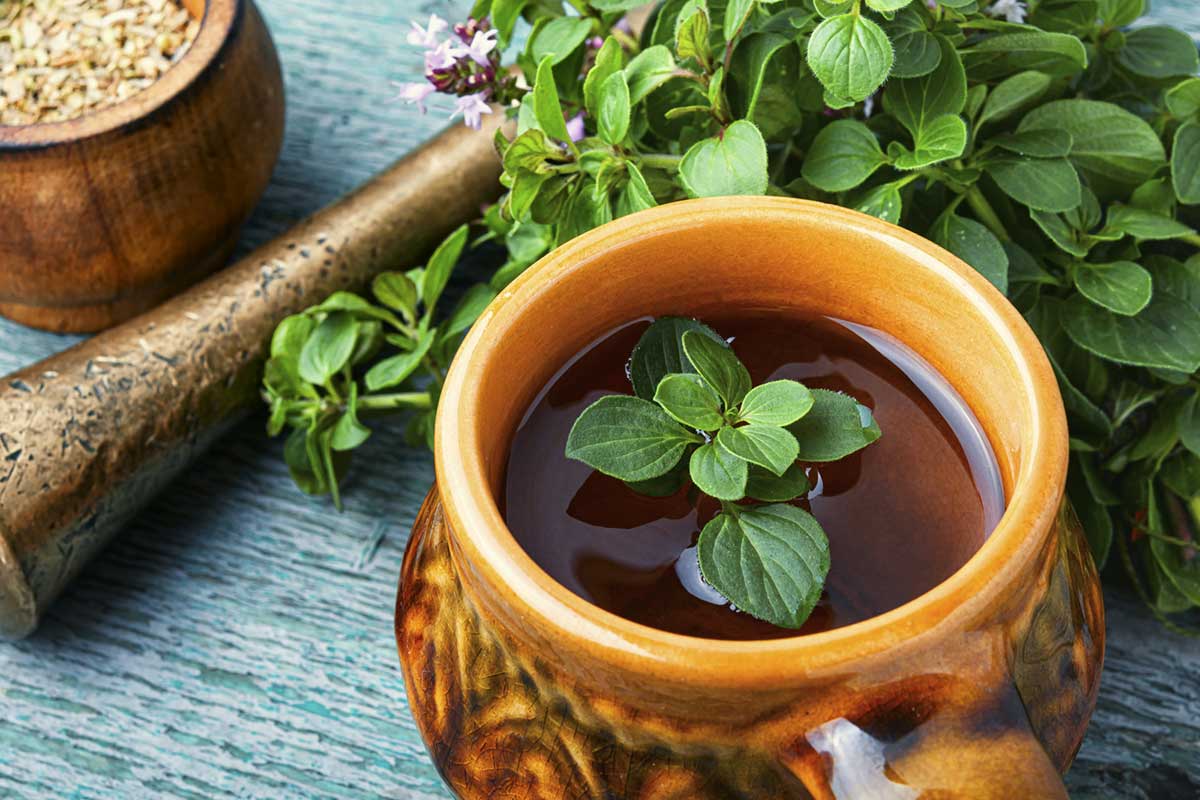
Oregano Tea
Oregano has natural antibacterial, antiviral, and anti-inflammatory properties that can help kick sinus symptoms to the curb, oftentimes in lieu of antibiotics. You can take oregano capsules as well as drink it as a tea for the medicinal benefits.
Sinus Benefits
- Relieves pressure: Oregano tea can help relieve symptoms such as stuffy nose, headache, and pressure in the sinuses.
- Antimicrobial and anti-inflammatory: It contains compounds like carvacrol, thymol, and rosmarinic acid which have antimicrobial and anti-inflammatory effects.
- Works as an expectorant: Oregano tea is a mild expectorant and can promote the elimination of mucus from the respiratory tract.
Other Health Benefits
Oregano tea is rich in antioxidants that support a healthy immune system and may help fight off common colds and flu. It also has antimicrobial properties that can aid digestion by reducing bacteria in the gut.
Side Effects
Some individuals may experience mild digestive discomfort when consuming oregano or oregano-based products. If you are allergic to other herbs in the mint family such as basil or sage, it’s advisable to exercise caution when consuming oregano tea.
Yaupon Tea
Yaupon tea, also known as the native American tea, is a type of herbal tea that is made from the leaves of the yaupon holly plant (Ilex vomitoria). Brewed yaupon leaves make for a smooth, earthy, and slightly sweet herbal tea. It has a pleasant aroma with hints of roasted nuts or chocolate.
Sinus Benefits
- Sinus relief: Yaupon tea contains antioxidants that can help reduce inflammation in the sinuses, providing relief from symptoms such as stuffiness, pressure, and pain.
- Decongestant properties: The caffeine present in Yaupon tea acts as a natural decongestant by opening up airways and promoting better airflow through the nasal passages. This helps alleviate nasal congestion.
- Immune support: Yaupon tea is rich in polyphenols and other compounds that support immune function. Drinking this tea regularly may boost your body’s ability to fight off infections like sinusitis.
- Antimicrobial effects: Some studies suggest that certain compounds found in Yaupon tea possess antimicrobial properties, which could help combat bacteria or viruses associated with sinus infections.
Other Health Benefits
- Boosts energy: Yaupon tea contains natural caffeine and other stimulants like theobromine and theophylline, which provide a mild energy boost without causing jitters or crashes .
- Supports digestion: Drinking yaupon tea has been linked to improved digestion due to its tannin content, which helps promote healthy gut function and alleviate digestive issues such as bloating and indigestion.
- Enhances immune system: The presence of flavonoids in yaupon tea can strengthen the immune system by supporting white blood cell activity and reducing inflammation in the body.
- Calming effect: While containing caffeine, yaupon tea also contains L-theanine, an amino acid known for its calming properties. This combination promotes relaxation while maintaining mental clarity.
- Potential weight management aid: Some studies suggest that compounds found in yaupon leaves could assist with weight management by increasing metabolism and promoting fat oxidation.
Side Effects
- Caffeine sensitivity: If you are sensitive to caffeine or have conditions such as high blood pressure or anxiety disorders, it’s advisable to limit your intake of yaupon tea due to its moderate caffeine content.
- Allergies or reactions: Some individuals may experience allergic reactions or sensitivities when consuming yaupon leaves if they have underlying allergies or sensitivities to related plants like holly trees.
Sounds great, right? You can buy yaupon tea here.
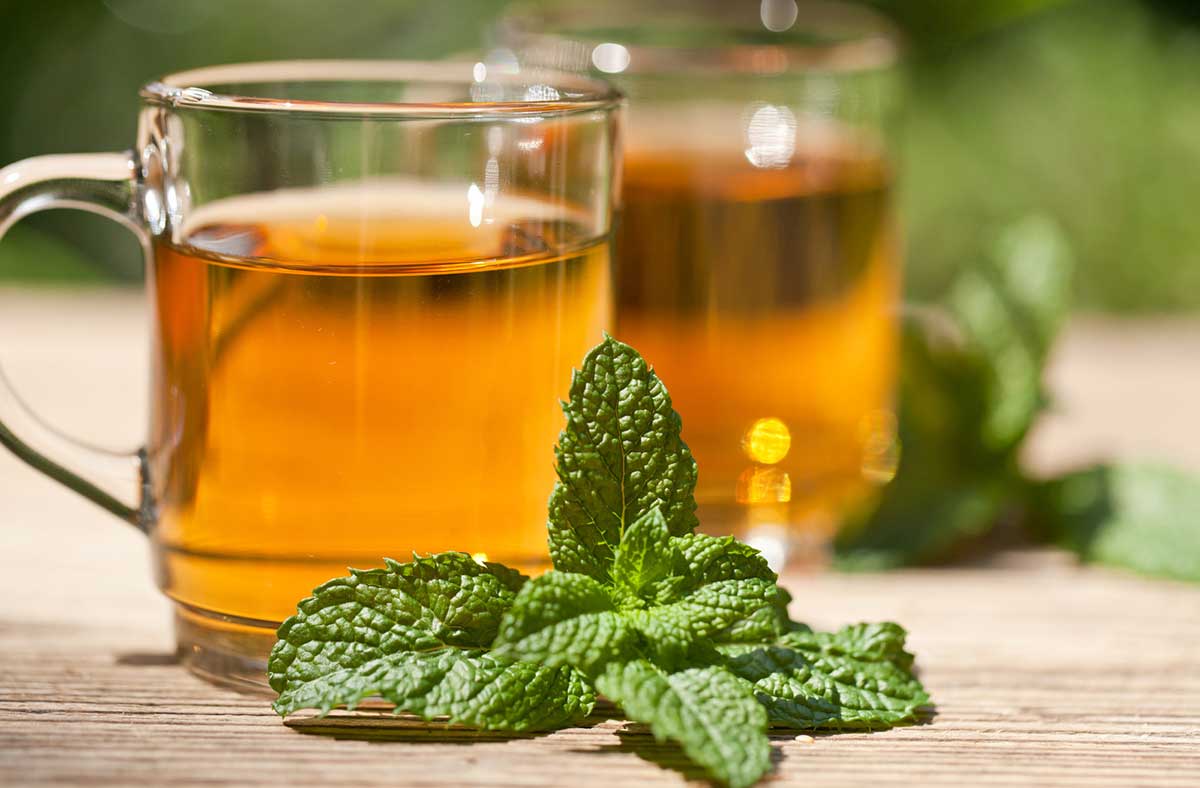
Peppermint Tea
Peppermint tea can be highly beneficial for sinus infections and nasal congestion.
Sinus Benefits
- Soothes the respiratory system: The menthol in peppermint helps to open up congested airways and relieve sinus pressure.
- Relieves sinus headaches: Peppermint acts as a natural pain reliever, easing headaches and muscle soreness.
- Works as a decongestant: Its main active ingredient, menthol, has powerful decongestant properties that can help relieve blocked sinuses and promote easier breathing.
Other Health Benefits
Peppermint tea also aids digestion by relaxing the muscles of the gastrointestinal tract and reducing bloating and gas.
Side Effects
Some individuals may experience heartburn or acid reflux due to the relaxation of the lower esophageal sphincter caused by menthol. Additionally, excessive consumption of peppermint tea may lead to allergic reactions in sensitive individuals.
It is important to note that if you have gastroesophageal reflux disease (GERD), hiatal hernia, or any pre-existing digestive conditions, it’s best to consult with your healthcare provider before regularly consuming peppermint tea.
Peppermint and Rosemary Tea
The combination of peppermint and rosemary as a tea can have a powerful effect when it comes to dealing with sinus issues.
Sinus Benefits
- Anti-inflammatory effects: The combination of peppermint and rosemary in the tea helps to relieve sinus congestion by reducing inflammation in the nasal passages.
- Natural decongenstant: Peppermint has menthol, which acts as a decongestant, helping to clear blocked sinuses and promote easier breathing.
- Antimicrobial properties: Rosemary contains compounds that have antimicrobial properties, which can help fight off any bacterial or viral infection causing your sinus issues.
Other Health Benefits
Both peppermint and rosemary are known for their antioxidant properties, which can help protect cells from damage caused by free radicals. This may contribute to overall immune system support.
Side Effects
Peppermint can sometimes cause heartburn or digestive discomfort in sensitive individuals. Additionally, if you’re pregnant or breastfeeding, it’s advisable to consult with your physician before consuming this herbal tea blend.
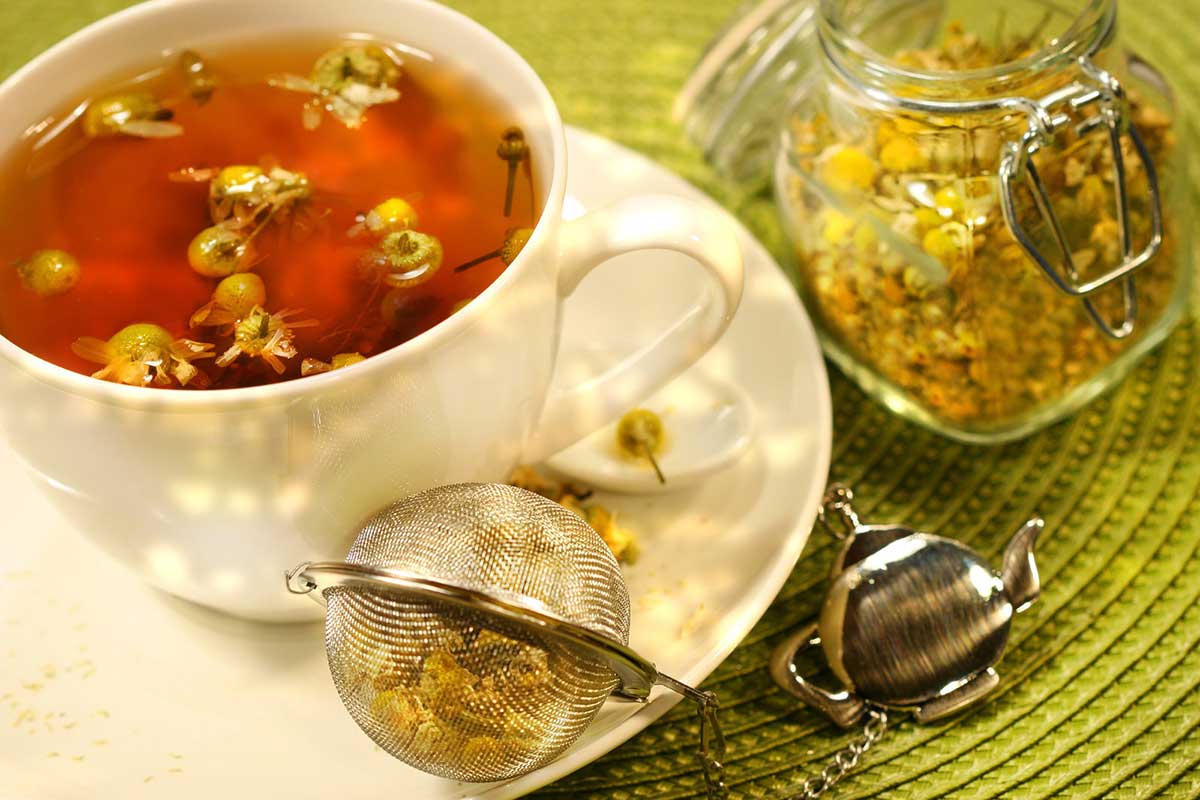
Chamomile Tea
Many people enjoy drinking chamomile tea for sinus infections and nasal congestion. Not only can it help ease some uncomfortable sinus symptoms, but it’s also a relaxing tea to drink.
Sinus Benefits
Chamomile tea can help to relieve sinus pressure and pain due to its anti-inflammatory properties, which can reduce swelling and inflammation in the sinuses.
Other Health Benefits
- Calming properties: Chamomile tea has calming properties that can help promote relaxation and improve sleep quality. This makes it a great option for those who struggle with anxiety or insomnia.
- Antioxidant properties: This herbal tea contains antioxidants that may help protect against certain chronic diseases by reducing oxidative stress in the body.
- Antimicrobial properties: Chamomile tea also has antimicrobial properties that can support overall immune health.
Side Effects
If you have a ragweed allergy or an allergy to other plants in the daisy family, you may be at risk of developing an allergic reaction to chamomile. Additionally, if you take blood thinners or sedatives, consult your doctor before consuming chamomile tea as it could interact with these medications.
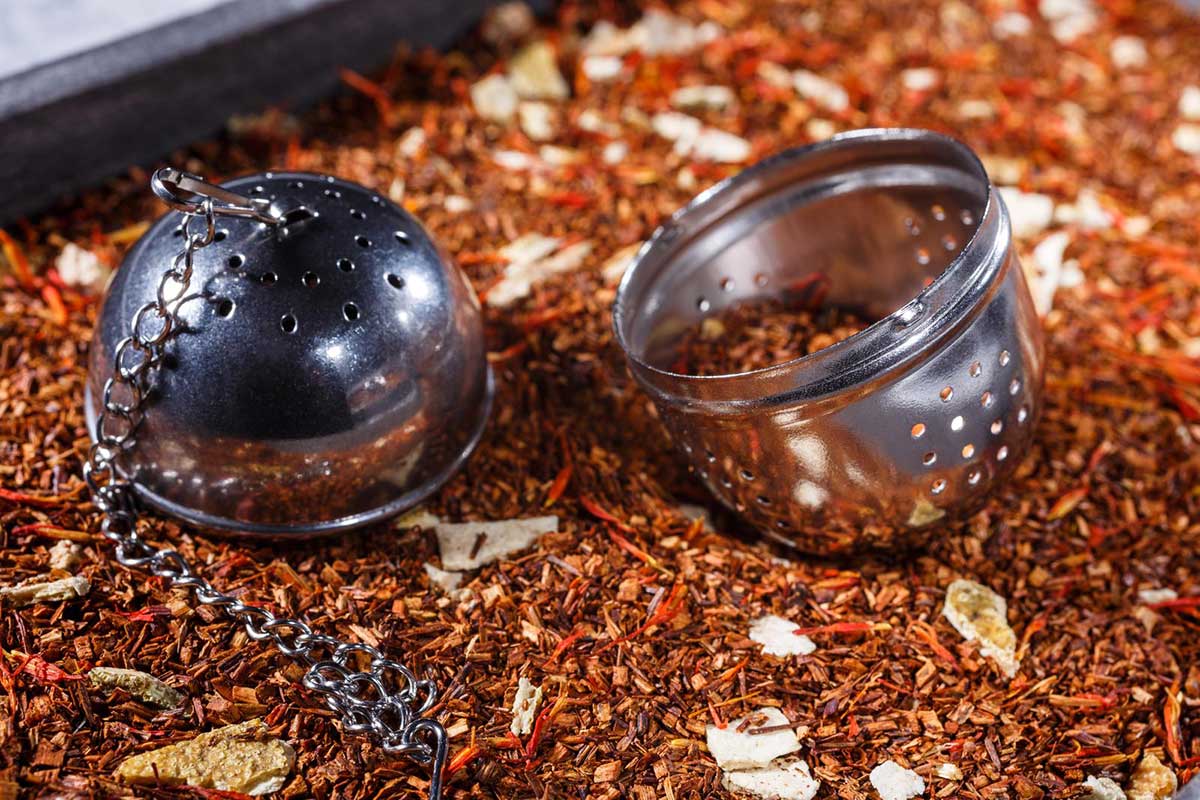
Rooibos Tea
Rooibos tea, also known as red bush tea, is a popular herbal tea that originates from South Africa. It is made from the leaves of the Aspalathus linearis plant, which are fermented and then dried to produce the characteristic reddish-brown color.
It offers a naturally sweet and slightly nutty flavor with hints of vanilla and caramel notes. Some describe its taste as earthy and smooth with subtle citrus undertones.
Sinus Benefits
- Anti-inflammatory: It can help reduce inflammation in the sinuses, relieve congestion, and promote easier breathing.
- Antioxidant properties: Rooibos tea contains antioxidants that boost the immune system, helping your body fight off infections more effectively.
Other Health Benefits
Rooibos tea is rich in antioxidants that protect against cell damage caused by free radicals. This can contribute to a healthier heart and reduced risk of chronic diseases such as cancer.
Rooibos tea also contains minerals like calcium, magnesium, and potassium which are essential for maintaining healthy bones and teeth.
Side Effects
Some individuals may experience allergic reactions to rooibos tea such as skin rashes or itching.

Cinnamon Tea
Cinnamon tea is made by steeping cinnamon sticks or powder in hot water. It has been enjoyed for centuries due to its unique flavor and potential health benefits.
Sinus Benefits
Cinnamon tea is beneficial for sinus infections and nasal congestion due to its natural properties. It helps in relieving inflammation, clearing blocked sinuses, and reducing mucus production.
- Anti-inflammatory properties: The anti-inflammatory compounds present in cinnamon can reduce inflammation in the body, including inflamed sinuses.
- Immune system support: Cinnamon tea can boost your immune system, helping you fight off infections such as colds and flu which often contribute to sinus issues.
Other Health Benefits
- Antioxidant-rich: Cinnamon contains powerful antioxidants that help protect the body against damage from harmful free radicals.
- Digestive aid: Drinking cinnamon tea may improve digestion by stimulating digestive enzymes and reducing bloating or discomfort.
- Blood sugar control: Cinnamon has been shown to have a positive impact on blood sugar levels, making it helpful for those with diabetes or insulin resistance.
Side Effects
Some individuals may be allergic to cinnamon or experience adverse reactions like skin irritation or difficulty breathing. Pregnant women should exercise caution when consuming large amounts of cinnamon as it may stimulate uterine contractions leading to complications during pregnancy.
Ceylon cinnamon is generally considered safe when consumed in moderation as part of a healthy diet; however, excessive consumption of cassia (a type of cinnamon) could lead to liver problems due to its higher coumarin content

Rosehip Tea
This type of tea is made from the fruit of the wild rose plant and offers a unique flavor profile that combines floral notes with subtle hints of tartness.
Sinus Benefits
- High in vitamin C: Rosehip tea contains high levels of vitamin C, which helps boost the immune system and fight off infections.
- Anti-inflammatory properties: The natural anti-inflammatory properties of rosehip tea can reduce swelling in the sinuses and alleviate congestion.
Other Health Benefits
Rosehip tea is rich in antioxidants that help protect cells from damage caused by free radicals. These antioxidants also promote healthy skin, support cardiovascular health, and may even have anticancer effects.
Side Effects
Due to its high vitamin C content, excessive consumption may lead to diarrhea or stomach upset.
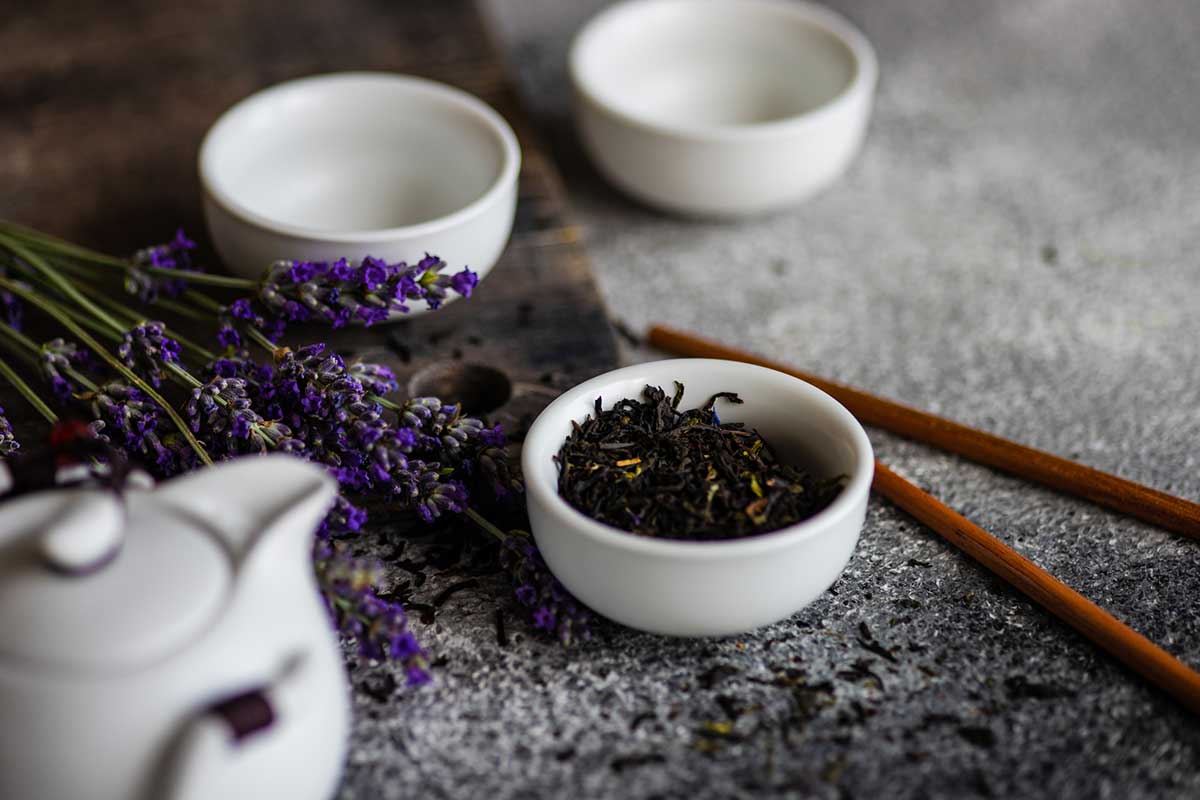
Lavender Tea
Lavender tea is made by brewing the dried flowers of the lavender plant. It is known for its calming aroma and soothing properties
Sinus Benefits
- Anti-inflammatory properties: The anti-inflammatory properties of lavender help reduce inflammation in the sinuses, relieving congestion and pressure.
- Antibacterial: Lavender has antibacterial properties that may help fight off infection-causing bacteria in the sinuses.
Other Health Benefits
- Lavender tea can aid in digestion by soothing an upset stomach or reducing bloating.
- It’s often used to help encourage relaxation and to help treat insomnia.
- Lavender also possesses antioxidant properties that protect cells against damage caused by free radicals.
Side Effects
Some individuals may experience side effects such as headaches or allergic reactions when consuming lavender tea.

Echinacea Tea
Echinacea tea is made from the Echinacea plant. It has been traditionally used to boost the immune system and treat various ailments, including sinus infections.
Sinus Benefits
- Anti-inflammatory: Echinacea tea has anti-inflammatory properties that help reduce inflammation in the sinuses, relieving congestion and promoting drainage.
- Immune stimulant: The tea also acts as an immune stimulant, helping your body fight off infection more effectively.
Other Health Benefits
- Echinacea tea can support overall immune function, making you less susceptible to colds and flu.
- Some studies suggest it may even shorten the duration of illness when taken at the onset of symptoms.
Side Effects
Possible side effects include allergic reactions, upset stomach, and dizziness. Additionally if you have certain health conditions, such as an autoimmune disorder, it’s important to use caution when comsuming echinacea as it stimulates the immune system.
The Best Herbal Teas for Sinuses
The list is long, isn’t it? Keep reading to learn about even more types of tea that are great for helping ease sinus discomfort.

Green Tea
Green tea is a type of tea that is made from the leaves of the Camellia sinensis plant. When it comes to sinus infections, drinking green tea can provide several advantages.
Sinus Benefits
- Anti-inflammatory: Green tea contains natural compounds called catechins, which have anti-inflammatory properties. These catechins help reduce inflammation in the nasal passages, relieving congestion and allowing easier breathing.
- Boosts Immune System: This tea is rich in antioxidants like epigallocatechin gallate (EGCG), which helps strengthen the immune system. By boosting your immunity, green tea can aid in fighting off sinus infections caused by bacteria or viruses.
Other Health Benefits
Apart from helping with sinus infections, green tea offers other health benefits too:
- Weight management: The EGCG found in green tea may boost metabolism and fat oxidation, aiding in weight loss.
- Heart health: Regular consumption of green tea has been associated with a reduced risk of heart disease due to its ability to lower cholesterol levels.
- Mental well-being: Green tea contains L-theanine, an amino acid that promotes relaxation and reduces stress levels without causing drowsiness.
Side Effects
Excessive consumption of green tea may lead to side effects such as caffeine sensitivity or insomnia due to its moderate caffeine content. It’s recommended not to exceed 3-4 cups per day.

Turmeric Tea
Turmeric tea is made by steeping ground turmeric in hot water. It’s used to help all sorts of inflammatory conditions. Turmeric tea also goes well with ginger for added benefits! I enjoy drinking Trader Joe’s turmeric and ginger tea.
Sinus Benefits
- Anti-inflammatory properties: Turmeric contains a compound called curcumin, which has powerful anti-inflammatory effects. Sinus infections often cause inflammation and swelling in the nasal passages, leading to congestion and discomfort. Drinking turmeric tea can help reduce this inflammation and provide relief.
- Antioxidant activity: Curcumin also acts as an antioxidant, protecting your body from damage caused by free radicals. This antioxidant activity helps strengthen your immune system, making it more efficient at fighting off infections like sinusitis.
- Natural decongestant: The warm steam from turmeric tea can help loosen mucus and relieve congestion associated with sinus infections. Additionally, the antibacterial properties of curcumin may help clear any bacterial infection causing or exacerbating your sinus symptoms.
Other Health Benefits
- Pain relief: Turmeric’s anti-inflammatory nature makes it helpful in reducing pain associated with conditions like arthritis.
- Digestive support: Turmeric aids digestion by stimulating bile production and improving gut health.
- Heart health support: Research suggests that regular consumption of turmeric may lower cholesterol levels and reduce the risk of heart disease.
Side Effects
Excessive use of turmeric tea could lead to stomach upset or interact with certain medications.
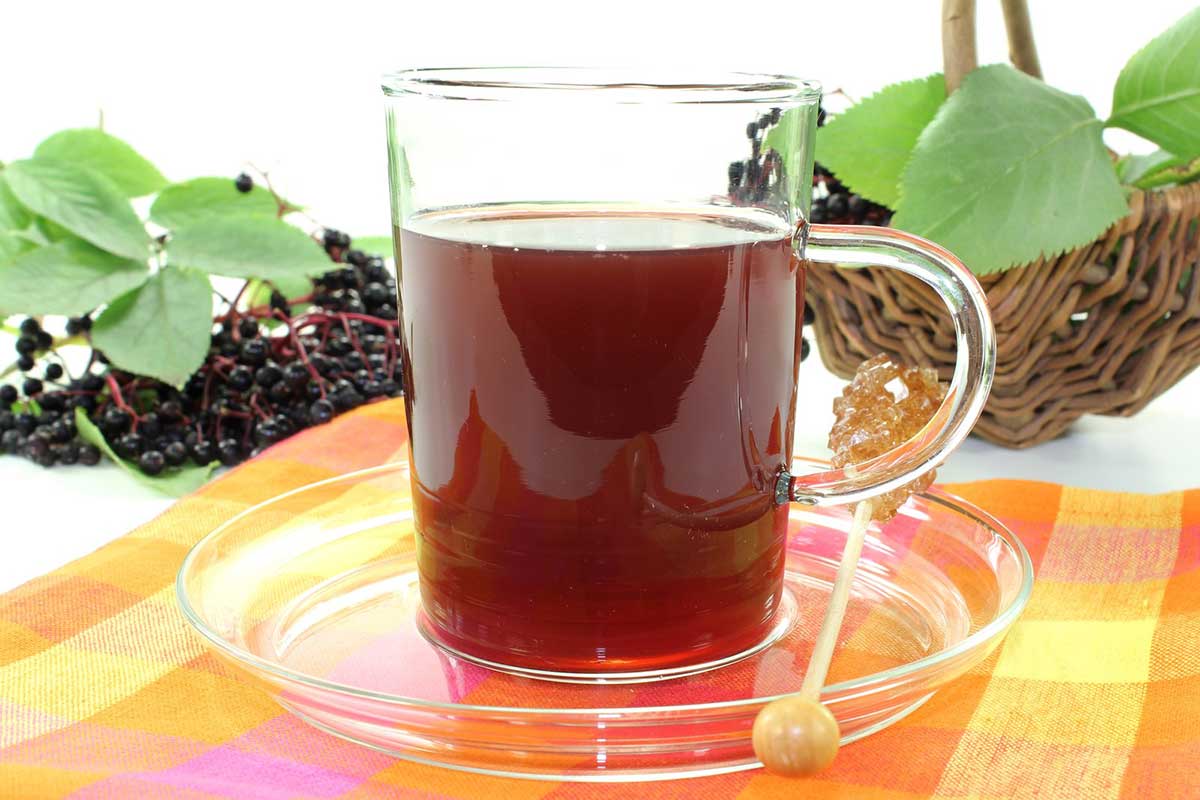
Elderberry Tea
Elderberry tea is a made from the dried flowers and berries of the elderberry plant.
Sinus Benefits
- Relieves congestion: Elderberries contain compounds that help reduce inflammation in the sinuses, easing nasal congestion and allowing you to breathe more easily.
- Boosts immune system: Elderberries are rich in antioxidants like flavonoids, which strengthen your immune system and support your body’s ability to fight off infections, including those causing sinusitis.
- Soothes sore throat: Sinus infections often come with symptoms such as a scratchy or sore throat. The anti-inflammatory properties of elderberry tea can help alleviate this discomfort by reducing inflammation in the throat area.
Other Health Benefits
- Cold and flu prevention: Regular consumption of elderberry tea may help prevent colds and flu thanks to its immune-boosting properties.
- Antioxidant-rich: Elderberries are packed with antioxidants that protect cells from damage caused by harmful free radicals.
Side Effects
Possible side effects of drinking elderberry tea include digestive issues such as nausea or diarrhea if consumed excessively. Some individuals may also experience allergic reactions; therefore, it is recommended to start with small amounts and monitor any adverse effects before increasing intake.
Additionally, elderberry stimulates the immune system, so use caution if you have an autoimmune disorder.
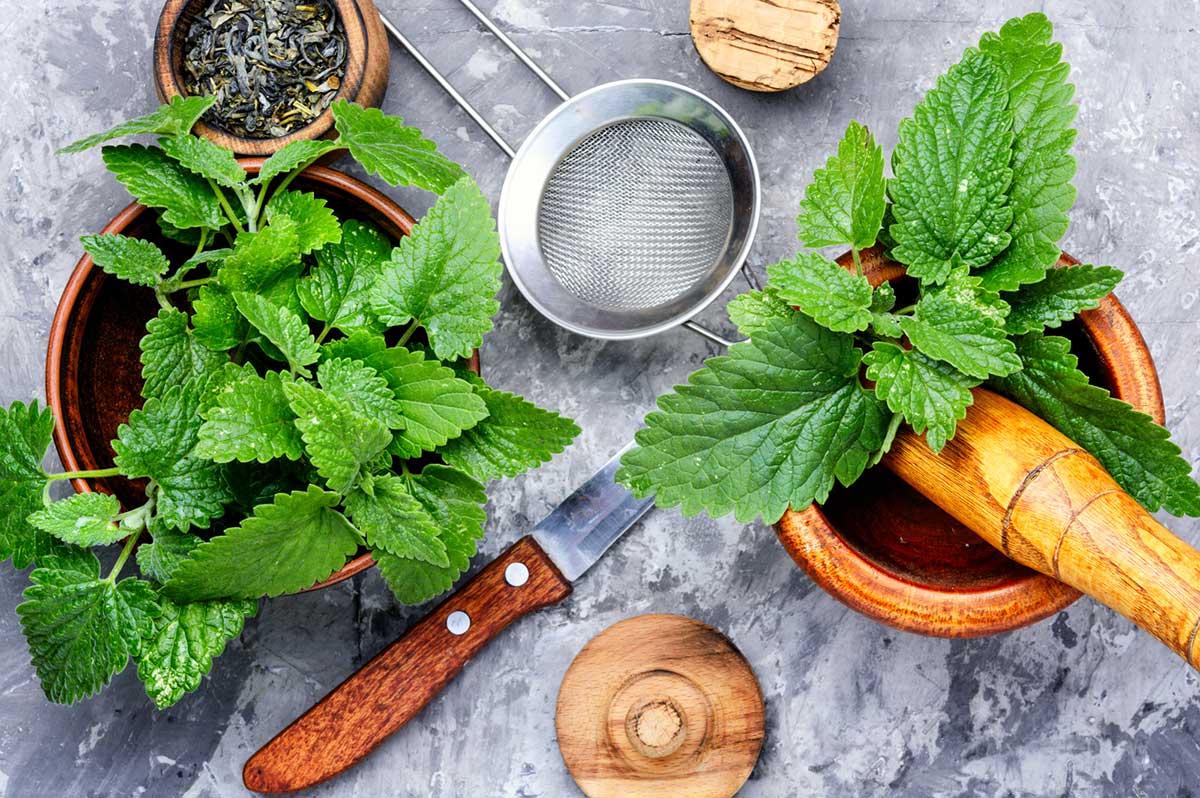
Lemon Balm Tea
Lemon balm tea is made from the leaves of the lemon balm plant, scientifically known as Melissa officinalis.
Sinus Benefits
- Relieves congestion: Lemon balm contains compounds that have natural decongestant properties. Drinking lemon balm tea can help soothe nasal passages and reduce inflammation, providing relief from sinus congestion.
- Fights infection: Lemon balm has antimicrobial properties that can help combat bacterial or viral infections in the sinuses. By drinking this tea regularly, you may support your immune system in fighting off sinus infections more effectively.
- Eases discomfort: Sinus infections often come with uncomfortable symptoms such as headaches and facial pain. The calming effects of lemon balm tea can alleviate these symptoms, promoting overall comfort during an infection.
Other Health Benefits
- Reduces stress and anxiety: Lemon balm has soothing properties that can help calm the mind and reduce feelings of stress and anxiety.
- Improves sleep quality: Drinking lemon balm tea before bedtime may promote relaxation and improve sleep quality.
- Supports digestion: Lemon balm is known to aid digestion by reducing bloating, gas, and indigestion.
Side Effects
Some individuals may experience mild side effects such as dizziness or stomach upset after consuming large amounts of lemon balm tea.
Clove Tea
Clove tea is made by steeping cloves in boiling water.
Sinus Benefits
- Relieves congestion: Clove tea contains natural compounds with anti-inflammatory properties that can help reduce inflammation and open up the nasal passages, providing relief from congestion caused by sinus infections.
- Fights infection: Cloves have antimicrobial properties that can help fight off the bacteria or fungi responsible for causing sinus infections. Drinking clove tea may support your body’s immune system in combatting these pathogens.
- Soothes discomfort: The warm nature of clove tea can soothe the discomfort associated with sinus infections, such as headaches and facial pain. Additionally, the aromatic properties of cloves can provide a calming effect on irritated sinuses.
Other Health Benefits
- Digestive aid: Cloves are known to promote healthy digestion by stimulating digestive enzymes and reducing bloating or indigestion.
- Oral health booster: Clove tea has been traditionally used as a remedy for oral issues like toothaches and bad breath due to its antibacterial and numbing effects.
- Anti-inflammatory effects: The active compounds found in cloves possess potent anti-inflammatory properties that may benefit conditions like arthritis when consumed regularly.
Side Effects
Some individuals may be allergic to cloves or their components, resulting in symptoms like skin rashes or difficulty breathing. Cloves also contain substances that might slightly thin the blood; therefore, people taking anticoagulant medications should exercise caution while consuming large amounts of clove products.
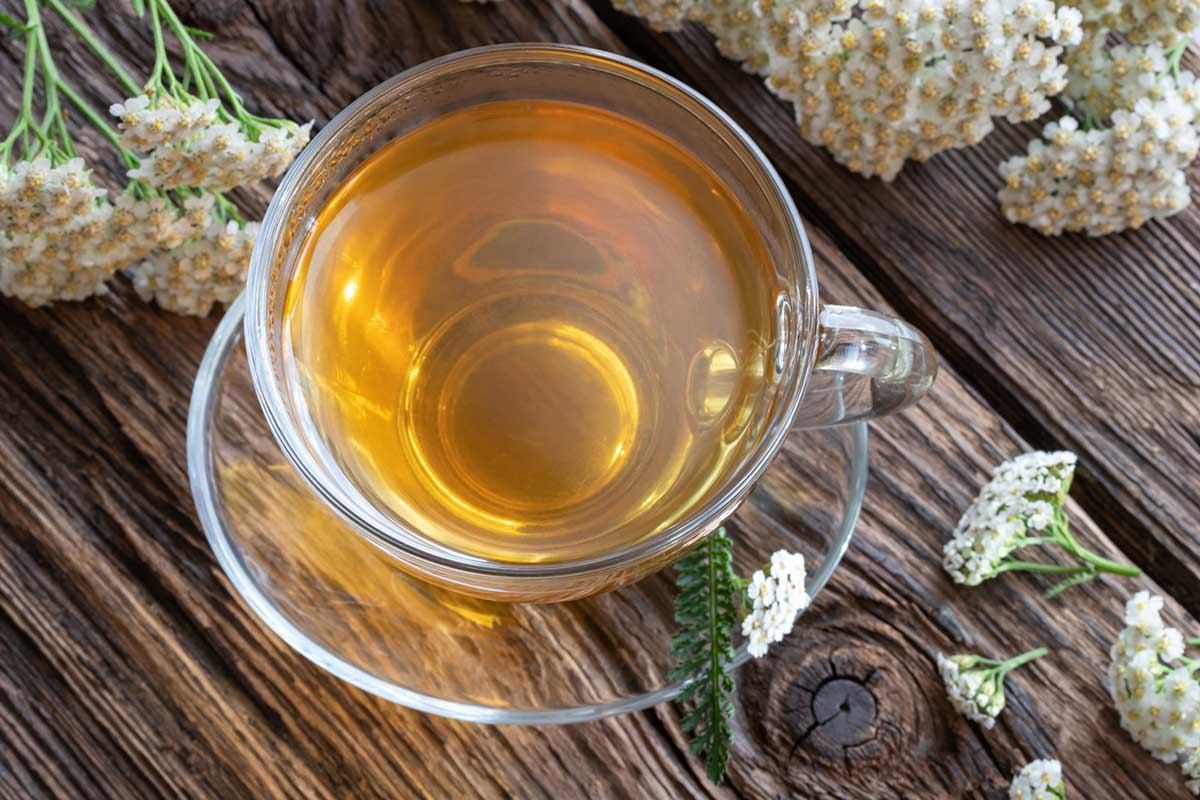
Yarrow Tea
Yarrow tea is made from the flowers and leaves of the yarrow plant, scientifically known as Achillea millefolium.
Sinus Benefits
- Relieves congestion: Yarrow contains natural compounds that help to reduce nasal congestion by promoting better airflow and clearing the sinuses. Drinking yarrow tea can provide relief from blocked or stuffy nose caused by sinus infections.
- Anti-inflammatory properties: Sinus infections often come with inflammation in the nasal passages, leading to discomfort and pain. Yarrow tea possesses anti-inflammatory properties that can help reduce swelling and alleviate these symptoms associated with sinusitis.
- Boosts immune system: Yarrow is rich in antioxidants, which support a healthy immune system. By strengthening your body’s defenses, drinking yarrow tea can aid in fighting off bacterial or viral infections that may contribute to sinus issues.
Other Health Benefits
- Digestive support: Yarrow has traditionally been used to promote digestion and soothe gastrointestinal discomfort.
- Menstrual cramp relief: The antispasmodic properties of yarrow make it useful in alleviating menstrual cramps.
- Wound healing: Applying cooled yarrow tea topically on minor cuts or wounds can assist in speeding up the healing process due to its antimicrobial effects.
Side Effects
Some people may experience side effects when consuming yarrow tea excessively or if they have specific allergies or medical conditions. Potential side effects include allergic reactions like skin rashes or stomach upset.
Eucalyptus Tea
Eucalyptus tea is made from the leaves of the eucalyptus tree. When it comes to sinus infections, drinking eucalyptus tea can provide several benefits.
Sinus Benefits
- Clears nasal congestion: Eucalyptus tea acts as a natural decongestant and helps clear blocked sinuses. The steam from the hot tea can help loosen mucus, making it easier to breathe and reducing nasal congestion.
- Relieves sinus inflammation: Eucalyptus contains anti-inflammatory compounds that can help reduce swelling in the sinuses, providing relief from pain and pressure associated with sinus infections.
- Fights bacterial and viral infections: Eucalyptus has antimicrobial properties that can combat both bacterial and viral infections in the respiratory system. Drinking eucalyptus tea may help prevent further infection or speed up recovery.
Other Health Benefits
- Soothes coughs and sore throat: The soothing properties of eucalyptus can alleviate coughs and soothe irritated throats.
- Boosts immune system: Eucalyptus contains antioxidants that support immune function, helping your body fight off illnesses more effectively.
- Provides relaxation: The aroma of eucalyptus has calming effects on the mind, promoting relaxation and relieving stress.
Side Effects
There are some possible side effects of drinking eucalyptus tea, such as allergic reactions or digestive issues like diarrhea or upset stomach if consumed excessively or by individuals with specific sensitivities.
Wild Thyme Tea
Wild thyme tea is made from the leaves of the wild thyme plant.
Sinus Benefits
- Relieves congestion: Wild thyme contains compounds with expectorant properties that help to thin mucus and reduce congestion in the sinuses. Drinking this tea can provide relief from blocked nasal passages and promote easier breathing.
- Soothes inflammation: Sinus infections often cause inflammation in the nasal passages, leading to discomfort and pain. The anti-inflammatory properties of wild thyme can help to soothe this inflammation, providing relief from symptoms such as facial pressure or headache.
- Boosts immune system: Wild thyme contains antioxidants and antimicrobial compounds that support a healthy immune system. By strengthening your body’s defenses, drinking wild thyme tea may help fight off infection-causing pathogens more effectively.
Other Health Benefits
In addition to these benefits for sinus infections, wild thyme tea also offers other health benefits such as improved digestion, relaxation, and antioxidant protection against free radicals.
Side Effects
Some people may experience allergic reactions or digestive issues like upset stomach or diarrhea after drinking wild thyme tea.
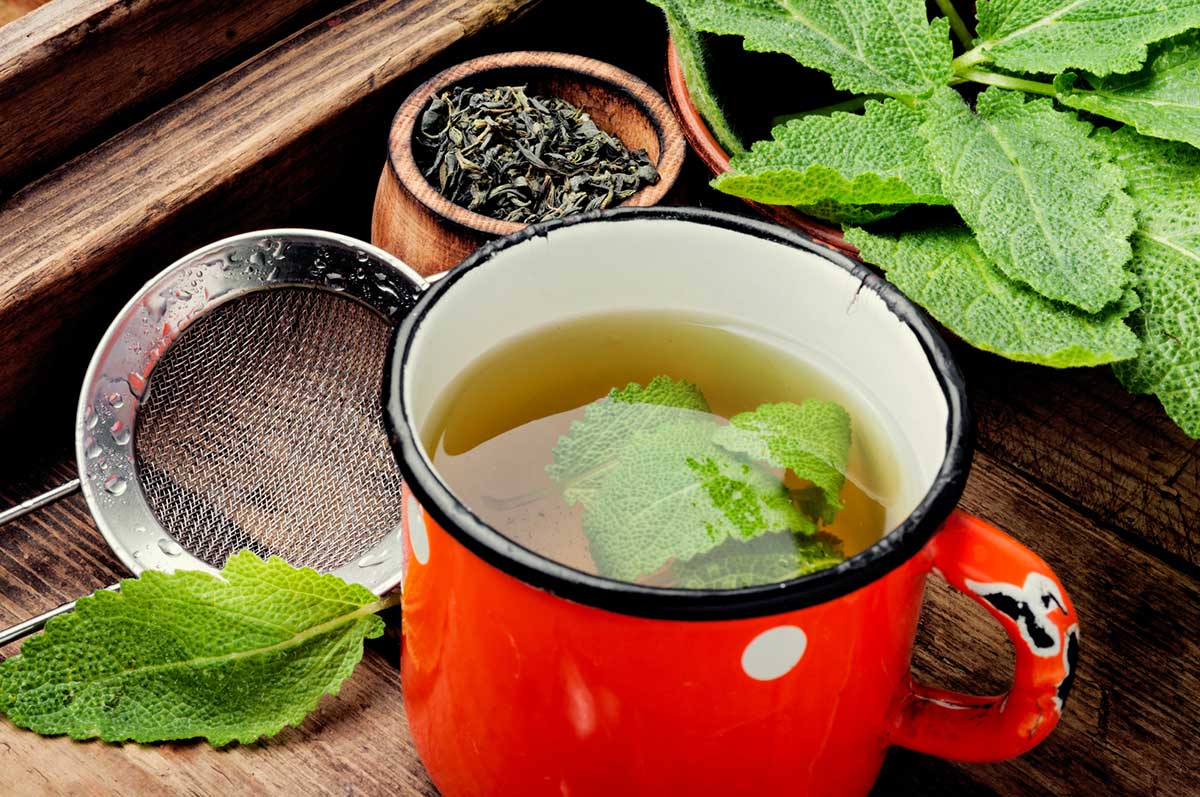
Sage Tea
Sage tea is made from the leaves of the sage plant.
Sinus Benefits
- Anti-inflammatory properties: Sage contains compounds with anti-inflammatory effects that can help reduce inflammation in the sinuses caused by infection. This can provide relief from symptoms such as nasal congestion and pain.
- Antibacterial properties: Sage has natural antibacterial properties that may help fight off bacterial infections commonly associated with sinusitis. Drinking sage tea regularly can support your body’s immune system in combating these infections.
- Antioxidant effects: Sage is rich in antioxidants which can help protect your body against oxidative stress caused by harmful free radicals. By reducing oxidative stress, sage tea may contribute to a healthier immune system and overall well-being.
Other Health Benefits
Drinking sage tea may also have other health benefits, including improved digestion, enhanced cognitive function, and promoting oral health.
Side Effects
Excessive consumption or long-term use may lead to certain side effects such as stomach upset or allergic reactions in some individuals.
Blackberry Tea
Blackberry tea is made from the leaves, fruits, or flowers of blackberries. It is known for its rich flavor and numerous health benefits.
Sinus Benefits
- Relieves congestion: Blackberry tea has natural anti-inflammatory properties that can help reduce nasal congestion caused by sinus infections. It may also help soothe irritated sinuses and promote easier breathing.
- Boosts immune system: Blackberries are packed with antioxidants such as vitamin C, which helps strengthen the immune system and fight off infections including sinusitis. Drinking blackberry tea regularly can support your body’s defense against bacteria or viruses causing sinus issues.
Other Health Benefits
- Supports digestive health: The high fiber content in blackberries aids digestion and promotes regular bowel movements.
- Enhances skin health: Antioxidants found in blackberries help combat free radicals that contribute to premature aging and skin damage.
- May aid weight management: Blackberries are low in calories yet rich in nutrients like fiber, making them a healthy addition to a balanced diet aimed at weight control.
Side Effects
There are no reported side effects specifically associated with drinking blackberry tea. However, individuals who have allergies or sensitivities towards berries should exercise caution before consuming it.
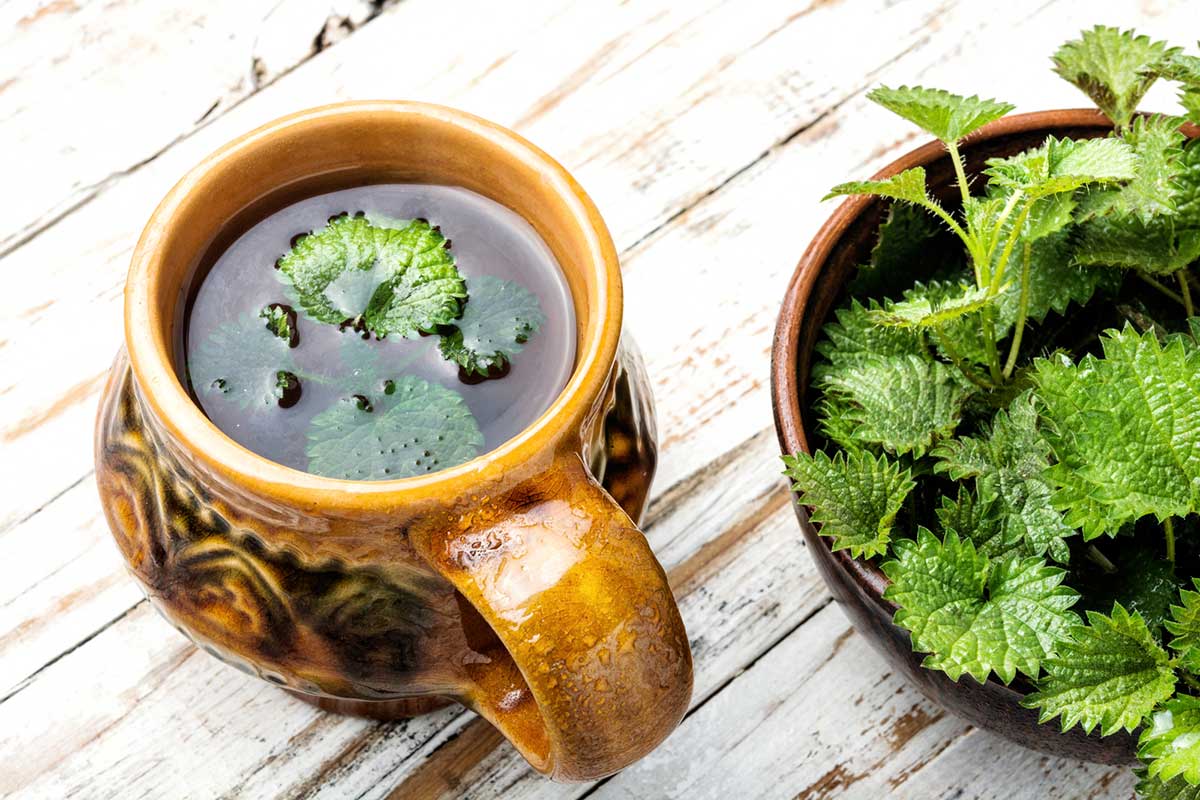
Nettle Tea
Nettle tea is made from the leaves of the nettle plant.
Sinus Benefits
- Anti-inflammatory properties: Nettle tea contains compounds that have anti-inflammatory effects on the body. This can help reduce inflammation and swelling in the sinuses, providing relief from sinus infection symptoms such as congestion and pressure.
- Natural antihistamine: Sinus infections are often accompanied by allergic reactions, which lead to increased production of histamines in the body. Nettle tea acts as a natural antihistamine, helping to block these histamines and alleviate allergy-related symptoms like sneezing and itching.
- Immune-boosting properties: The nutrients found in nettle tea, including vitamins A and C, iron, and antioxidants, support immune function. By strengthening your immune system, nettle tea may help fight off sinus infections more effectively.
Other Health Benefits
- Allergy relief: As mentioned earlier, nettle tea’s antihistamine properties make it useful for managing seasonal allergies.
- Joint pain relief: Some studies suggest that consuming nettle tea may help reduce joint pain associated with conditions like arthritis.
- Blood sugar control: Preliminary research indicates that regularly drinking nettle tea could potentially assist in regulating blood sugar levels.
Side Effects
Some people may experience mild side effects from drinking nettle tea such as an upset stomach or skin rash.
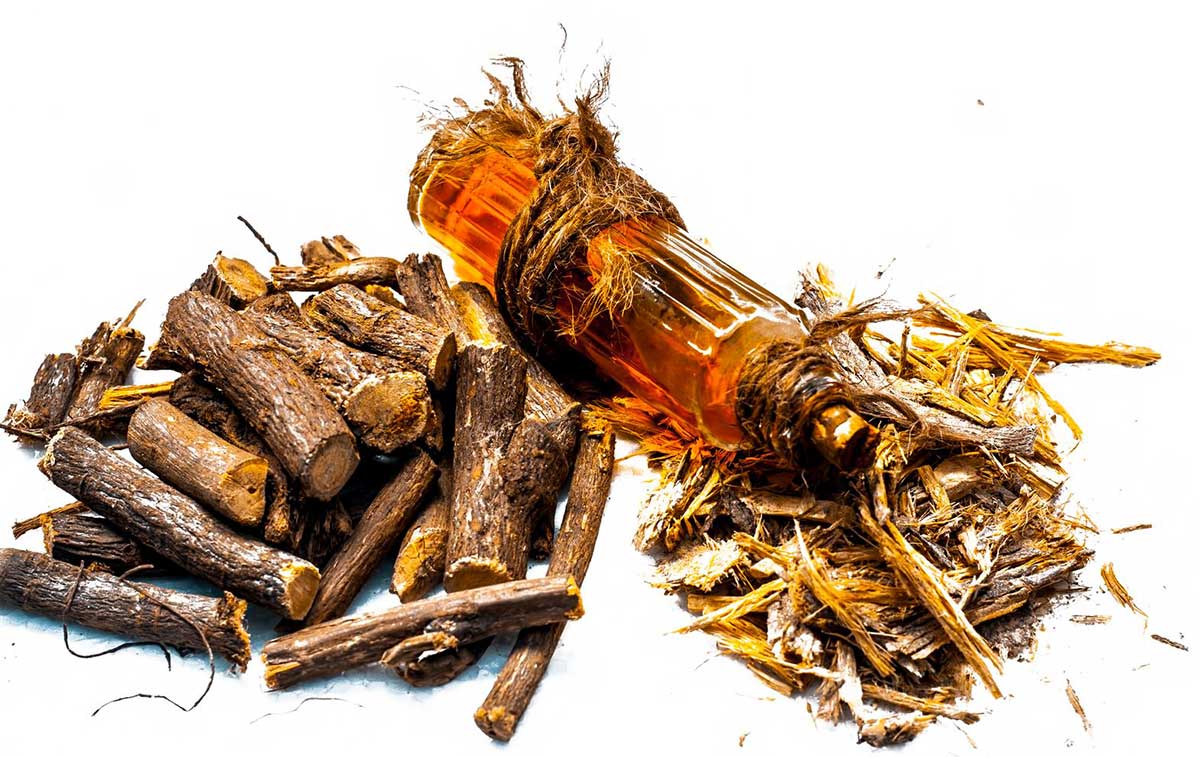
Licorice Root Tea
Licorice root tea is made from the dried roots of the licorice plant.
Sinus Benefits
- Anti-inflammatory properties: Licorice root contains compounds that have anti-inflammatory effects on the body. This can help reduce inflammation in the sinuses, easing congestion and promoting better drainage.
- Soothing effect: The natural soothing properties of licorice root can help alleviate discomfort caused by sinus infections. Drinking licorice root tea may provide relief from symptoms such as nasal irritation, sore throat, and coughing.
- Immune system support: Licorice root is known to boost the immune system’s response to infections. By strengthening your immune system, it helps your body fight off sinus infections more effectively.
Other Health Benefits
- Digestive health: It can help soothe digestive issues like indigestion, heartburn, and stomach ulcers.
- Respiratory conditions: Licorice root may also be beneficial for respiratory conditions such as bronchitis or asthma due to its expectorant properties.
- Stress relief: Some studies suggest that licorice root may have calming effects on stress levels and promote relaxation.
Side Effects
Licorice root tea should be consumed in moderation as excessive intake could lead to side effects such as increased blood pressure or low potassium levels.
It’s important to note that while herbal teas can provide relief from sinus infections and nasal congestion, it should not replace medical treatment if symptoms persist or worsen. Always consult with a healthcare professional for proper diagnosis and advice on managing your condition.
Best Teas For Congestion
If you are just looking for an herbal tea to help with congestion and not necessarily a sinus infection, here are the best teas to fight congestion.
- Peppermint tea: Known for its soothing properties and ability to open up the nasal passages.
- Eucalyptus tea: Contains compounds that help clear mucus and reduce inflammation.
- Ginger tea: Has anti-inflammatory properties and can help relieve sinus congestion.
- Chamomile tea: Known for its calming effects, it can also alleviate symptoms of congestion.
- Green tea: Packed with antioxidants, it may help boost the immune system and reduce congestion.
- Lemon balm tea: Can have a calming effect on respiratory discomfort caused by congestion.
- Thyme tea: Contains compounds that support respiratory health and ease chest congestion.
- Elderflower tea: Traditionally used to treat colds and flu symptoms including nasal congestion.
- Nettle leaf tea: Known for its antihistamine properties, which may help relieve allergy-related congestion.
- Licorice root tea: May soothe inflamed airways and promote healthy mucus production.
Why Tea is Good for Sinus Infections
When you have a sinus infection, the sinuses become inflamed and congested, causing discomfort and difficulty in breathing. Hot tea can help alleviate these symptoms in several ways.
- The steam from the hot tea can provide relief by moisturizing and soothing the nasal passages.
- The warmth of the tea helps to loosen mucus and clear congestion, making it easier for you to breathe.
- Certain types of herbal teas like chamomile or peppermint contain natural anti-inflammatory properties that can help reduce swelling in your sinuses. These teas also have antimicrobial properties that may assist in fighting off any underlying bacterial or viral infections contributing to your sinus troubles.
- Drinking hot tea promotes hydration which is essential for thinning out mucus secretions. Staying well-hydrated helps prevent mucus from becoming thick and sticky, reducing blockages in your sinuses.
- Sipping on warm tea provides comfort and relaxation during times of discomfort caused by sinus infections.
Other Home Remedies for Sinus Infections
You can add crushed lemon seeds to your hot tea for sinuses. Believe it or not, one of the health benefits of lemon seeds is that the can help reduce allergy symptoms!
You can also try these natural remedies:
Steam Inhalation
Inhale steam by leaning over a bowl of hot water with a towel draped over your head to relieve congestion.
Saline Nasal Irrigation
Use a neti pot or saline spray to flush out mucus and irritants from the nasal passages.
Warm Compresses
Apply warm compresses on your face to soothe sinus pain and reduce inflammation.
Stay Hydrated
Drink plenty of fluids like water, herbal tea, and chicken stock to keep the mucus thin and flowing.
Eucalyptus Oil
Add a few drops of eucalyptus oil to hot water and inhale the steam for its antimicrobial properties that can help alleviate sinus infection symptoms.
Apple Cider Vinegar Gargle
Mix apple cider vinegar with mother with warm water and gargle several times a day to help clear mucus from the throat.
Garlic Consumption
Incorporate raw garlic or fermented garlic into your diet or take garlic supplements known for their antibacterial properties which could combat sinus infections effectively.
Probiotics
Include probiotic-rich foods like raw sauerkraut, coconut yogurt or kefir in your daily meals as these promote healthy gut bacteria balance which may indirectly support immune function against infections including sinuses.
Elevate Your Head While Sleeping
Use an extra pillow or raise the head of your bed to help reduce congestion and promote better drainage.
Avoid Known Irritants
Stay away from allergens, smoke, and other environmental triggers that can worsen sinus infections.
Rest And Relaxation
Give yourself ample rest to allow your body to heal naturally.
How to Avoid Sinus Infections
The best way to avoid a sinus infection is to treat allergies as soon as you have symptoms. If you let post-nasal drip and sinus congestion go on for too long, you run the risk of getting a sinus infection.
Using a neti pot and saline spray frequently can help keep your nasal passages clear.
Learn about the impressive allergy benefits of wildflower honey.
What’s the Difference Between Sinus Headaches and Migraines?
Migraines and sinus headaches are two different types of headaches with distinct characteristics.
Sinus Headaches
These headaches occur when the sinuses become inflamed or blocked. Common symptoms include pain and pressure around the forehead, cheeks, and eyes. Sinus headaches often accompany sinus infections or allergies.
Migraines
Migraines are neurological conditions characterized by severe throbbing pain usually on one side of the head. Migraine attacks can last for hours or even days and may be accompanied by nausea, vomiting, sensitivity to light and sound, as well as visual disturbances.
While both sinus headaches and migraines can cause head pain, they differ in their underlying causes and accompanying symptoms. Sinus headaches result from sinus inflammation or blockage, whereas migraines involve abnormal brain activity.
Final Summary
Whether you are fighting cold symptoms, sinus congestion, or just staying hydrated during flu season, a warm cup of tea is a natural way to nourish your body and soothe mucous membranes. Whether it’s an herbal tea or even a breakfast tea, you can soothe nasal congestion in a natural way by drinking hot tea with some raw honey.
Sources
- https://www.pennmedicine.org/for-patients-and-visitors/patient-information/conditions-treated-a-to-z/sinus-infections-sinusitis
- https://my.clevelandclinic.org/health/diseases/17701-sinusitis
- https://www.mayoclinic.org/diseases-conditions/acute-sinusitis/symptoms-causes/syc-20351671
- https://www.verywellhealth.com/home-remedies-for-sinus-infection-7693419
- https://www.cventdocs.com/blog/natural-home-remedies-for-sinusitis
- https://artfultea.com/blogs/wellness/best-teas-for-inflammation
- https://www.webmd.com/diet/can-tea-help-with-inflammation
- https://www.peacehealth.org/medical-topics/id/hn-2086009
- https://www.medicalnewstoday.com/articles/249460


